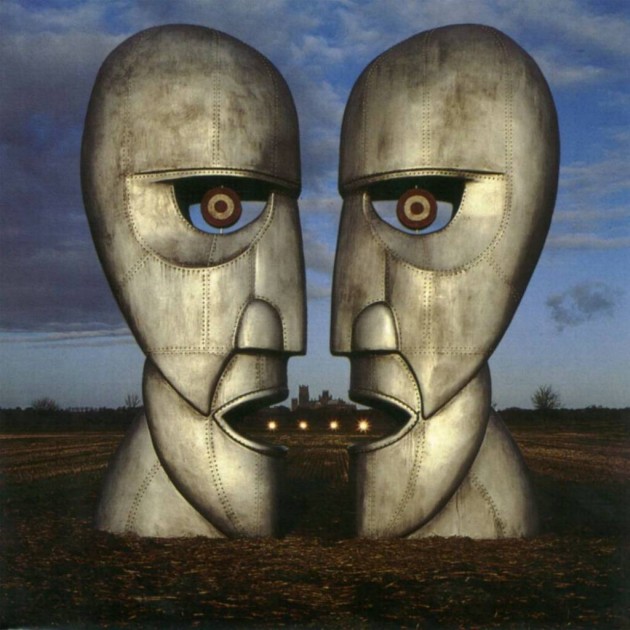Apparently, Pink Floyd are set to release new music. Well, ‘new’ music. It says so on Polly Samson’s Twitter. And frankly, she should know. After all, she wrote most of The Division Bell, and now lists herself as the writer of something called The Endless River, a record made by her husband David Gilmour, featuring various other people, and credited to Pink Floyd. And if all this turns out to be the case (which it does) then there’s every chance that music fans are in for a pretty grim Autumn, as another catastrophically over-content monstrosity will be dumped upon us, and whether we like it or not, the words “PINK” and “FLOYD” will be everywhere.
This new record is a product of Gilmour-Floyd, in the same way that 1967’s Piper at the Gates of Dawn was a product of Syd Barrett-Floyd, and almost everything between 1970 and 1983 was a product of Roger Waters-Floyd. On his website, David Gilmour describes himself as “The voice and guitar of Pink Floyd”, which is pretty much true. Except when Syd was playing guitar and singing. Or Roger Waters was singing. Or occasionally playing guitar. Or when Rick Wright was singing. So, maybe if we ponder it, there might be a case for Gilmour to change his tag-line to, “The occasional voice and guitar of some Pink Floyd songs, and latterly the only real voice and guitar of Pink Floyd on their two worst albums, with one more in the pipe-line”. It’s a little bit unwieldy, and he’ll probably have to change it when the new one comes out, but it’s more or less bang-on.
Why such resentment? Well, The Endless River is based on sessions recorded at the same time as The Division Bell, and if they share literally anything in common with that album, the results will surely be enough to make any self-respecting human being barf their own soul out. You see, there’s a reason that The Division Bell looked like it was going to be the final Floyd album; it was a product of Very Rich Men with Nothing To Say being given free rein to vent their petty complaints and frustrations upon a fanbase who will almost certainly never approach anything resembling the kind of lifestyle being whinged about on record. It’s an album that makes the spectacular crime of requiring the listener to be absolutely obsessed and fascinated with the very idea of being in Pink Floyd, whilst simultaneously having to listen to the members of Pink Floyd complain about being in Pink Floyd.
The first real song of the album is entitled ‘What Do You Want From Me?’, and finds Gilmour slumped in a fug of indifference, drained by the expectations placed upon him by his always demanding fanbase. The poor guy just wants an easy life, but these people – these scumbag – keep coming to his shows, buying his records, and wanting more and more and more. “Should I sing until I can’t sing anymore?” he pleads, “Play these strings ‘til my fingers are raw… what do you want from me?” Only the most hardened listener could fail to be moved by Gilmour’s entirely reasonable request that his own fans stop thinking he’s such a great and all-round awesome guy. He just wants to be left alone, away from the pressure and the expectancy. After all, he’s pretty much the last Floyd-er standing, with Roger and Syd having crashed and burned (sort of) and Rick Wright essentially clinging on as a session musician in his own band, whilst Nick Mason’s role in Pink Floyd is always open to debate. Rock and roll is hard, man!
‘Poles Apart’ continues on this theme, with Gilmour expressing concern for Syd, and a sense of disappointment for Roger. Realistically, you’d have to have a pretty sure knowledge of the Pink Floyd story for these lyrics to really mean anything other than some kind of vague sentiment about… resentment? Regret? It’s hard to say. Either way, this is a song about how being in Pink Floyd is hard work, man!
After a bit more music, we arrive at ‘A Great Day for Freedom’, a song about “the wall” coming down, and how, y’know, things aren’t always as great as they seem. Or something. Certainly, David Gilmour has gone to some lengths to point out that whilst he plays in a band that had an album called The Wall, and whilst he had a fairly serious falling out with his bandmate Roger Waters over this particular wall, that “the wall” mentioned in the song isn’t Roger Waters’ The Wall, nor any other kind of wall. It just isn’t. Move on. Being Roger Waters’ former bandmate is hard, man!
Then comes ‘Wearing the Inside Out’, the first Rick Wright vocal performance on any Pink Floyd album since The Dark Side of the Moon in 1972. He tells a tale of being somewhat washed out, of being overworked, and being a bit… vague. In the middle, Gilmour pops up to let us know, “Look at him now, he’s paler somehow, but he’s coming round. He’s starting to choke, it’s been so long since he spoke, well, he can have the words right from my mouth.” A lovely patronising sentiment to his former full-time bandmate, whom he stood back and watched get removed from his own band, before eventually re-hiring him as a session musician. Hell, as a ‘pat on the head’, they even re-instated him as a full time member of the band on this record. Being supportive of Rick Wright is hard, man!
And on it goes.
The really glaring problem with The Division Bell is that some of the music is pretty damn excellent, concise, taut, and without any flab. The later Roger Waters-era Floyd could be a little bit on the flimsy side when it came to tunes, but The Division Bell has melodies in spades. But sadly, they’re all saddled with really frumpy, plodding lyrics about being in Pink Floyd, thus rendering them impotent. For all its stately grandeur, the overriding sound of The Division Bell is the listener’s own teeth being ground down in frustration.
As such, it was fitting that the curtain came down after that one. The band still fired out live albums, even burying the hatchet with Waters to reunite at Live8 to end global poverty, but it felt like the story had ended. Wright passed away in 2008, and the prospect of an epilogue seemed unlikely, but now we have another chapter looming on the horizon, and sense of dread growing within our bosom (possibly).
Pink Floyd made some incredible music that still stands the test of time, but by 1994 they’d become the musical equivalent of Man at C&A, a functional, utilitarian idea of music, utterly devoid of grace, élan, or relevance. God knows what’s going to happen next, but there’s a good chance it ain’t going to be pretty.
And that means more pain for David Gilmour. It’s hard being David Gilmour, man! Steven Rainey






